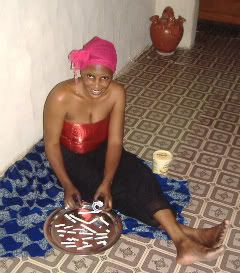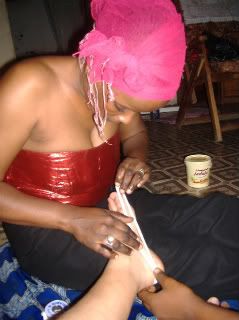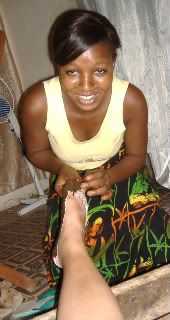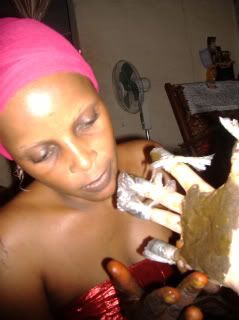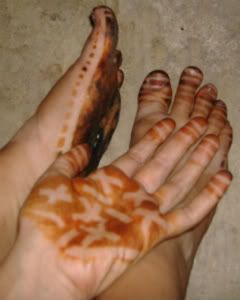December
I spent December on vacation in Italy. It was wonderful as European vacations are meant to be, so I'll just give it a quick description. Mom and Jim met me in Rome. I had my biggest taste of culture shock at the airport when I found myself wanting to talk with strangers and realized they were shying away from me. I was acting like a Pulaar, expecting everyone to be willing to chat and reveal personal information. I nearly teased a taciturn fellow about my being his wife, just to get the conversation going, before I caught myself. After this, everything felt familiar and natural.
It was great spending time with Mom and Jim. We visited the Pope and got his blessings, toured the Vatican, the Pantheon, the Coloseum, the Capuchin monks, and many other fine sights. The food was stunning, and the Christmas decorations and markets were charming. My mother kept a daily journal which I hope she will post.
After two weeks in Rome I was left on my own, and I traveled up to Florence. The train was ridiculously nice. After the potholes, heat, tight quarters, smells, hours and hours, and hours of travel in Senegal, which happens on no schedule and only takes place when the car fills, it was a pleasure to have a spacious, cool, smooth, swift, and timely mode of transit that had a bathroom on board. Not to mention the scenery. I gasped at the sight of snow.
I passed a few days in Florence's museums, my favorite of which was a small one filled with mosaics, and I took a day trip to Pisa (which is so much more than just a leaning tower). I found that at least half of the street vendors in Florence were Senegalese. It gave me a kick to be able to practice my Pulaar, but none of them seemed especially surprised by it. I can go down the path from my hut and find people amazed at a white girl speaking Pulaar in a region where the majority is Pulaar, but in Italy it didn't much phase anyone.
From Florence I traveled to Venice with a few people I met at the hostel. We arrived at night, and I think this is the best way to meet this city. It felt like we were entering a majestic and lyrical world. After the intense touring of Rome and Florence, I meandered around Venice and spent a long time lost. The highlights here were the pigeons, the church with a wall to wall mosaic floor, the Guggenheim museum, the island of Murano, a visual candy store, where nearly every store is a stained glass shop or factory, and the other travelers at the hostel.
Next was Cinque Terra, one of the most beautiful places on earth. I arrived on Christmas eve. On Christmas day the Brazilians who were staying with me at the hostel and I hiked the trail along the coast, past the narrow shelves of vineyards, and up and down the hills. Christmas day was the perfect day to do the trip. There was nearly no one on the trail besides us and the fat felines who sat preening at every picnic spot. I spent the next week at Cinque Terra and saw the five towns and the trail steadily grow more crowded. I hiked on side trails, sat by the ocean, cooked broccoli and mushrooms with every meal, and attended a klezmer and a gospel concert. LOvely!
The day before I was to leave Italy I took a train to Milan where the Brazilians met me, gave me a three hour tour of the city, and took me to their apartment. They live with a couple and their new baby. I was received with open arms and great warmth. We had no one common language, but using English, French, Portugese, and hands and grins, we were able to joke and compare life in Brazil, Senegal, and Italy. It surprised me how sweet it felt to be at home again with a western family.
Getting home was a small fiasco. Senegal has an agreement with Europe and the US about not letting people enter Senegal without proof of residency or proof of intent to leave within three months. I learned this from the woman at the airport who refused to issue me a boarding pass. My Peace Corps passport and ID would not suffice, and no airline nearby sold easily refundable tickets. My request to see a manager brought me a man who yelled at me about the US treatment of Mexican immigrants. When the plane was due to leave in thirty minutes, the woman finally printedme a ticket to Lisbon, where I was scheduled to have long layover. When I tried to get my ticket for Senegal in Lisbon this woman told me Milan had called about me. International sensation, dying to sneak into Senegal and wreck the place, am I. She told me to wait a while. I couldn't get through to Senegal, so I called my mom for advice. She phoned Peace Corps and got someone in DC who said, "Yes, this happens. Sometimes volunteers have to wait a few days before they can return to their countries." And yet it is never mentioned in training, and we are not given any papers to satisfy the airlines. Cute. The head of security in Senegal was more willing to help, but he had no luck speaking to airline personnel. Eventually I found a merry man who decided to give me a New Year's present, and he overroad the computer program to issue me my boarding pass. When I got to the airport in Milan I wasn't thrilled about returning to Senegal, but the ordeal got me so wound up that I leapt with joy when I finally got the pass. I returned home to Senegal in a far more gleeful and grateful state than I would have otherwise.
